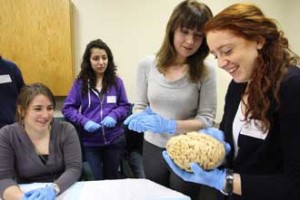
Event introduces high schoolers to career options in health sciences
By Jim Hynes
They may not know it themselves yet, but part of the solution to the shortage of health-care professionals in Canada may be sitting in a high school classroom near you at this very minute.
Getting Canadian youth interested in the health sciences is one of the challenges facing the medical establishment. The Canadian Medical Hall of Fame and its sponsors and partnering institutions are taking a proactive approach to meeting that challenge.
On Nov. 28, more than 200 students from 28 Montreal-area high schools took part in the annual Discovery Day in Health Sciences at the Montreal Neurological Institute (MNI) and at various locations within the Faculty of Medicine. The event, organized by the MNI and McGill’s Faculty of Medicine in a partnership with the Canadian Medical Hall of Fame, helps introduce high school students to possible health sciences careers.
“This is a remarkable opportunity for students across Montreal,” said Dr. David Colman, Director of the MNI. “The Canadian Medical Hall of Fame should be commended for this important national initiative that allows us to showcase the possibilities and prospects that exist for students to excel and advance science and medicine.”
“Discovery Day offers a wonderfully unique occasion for young people to explore the fascinating world of health sciences while directly contributing to our university mission to prepare the physicians and scientists of tomorrow,” said Dr. Richard I. Levin, McGill’s Vice-Principal (Health Affairs) and Dean of the Faculty of Medicine. “We are very proud to partner with The Canadian Medical Hall of Fame and the MNI to help inspire these students in our community to become the next generation of leaders in health care and discovery.”
This year’s event, which attracted nearly double the number of participants over previous years, featured 15 different health sciences workshops on everything from the anatomy of the human brain to how MRI, X-Ray and ultrasound technology can be used in studying the brain and spinal cord, a look at what occupational therapists do, and case studies involving a physical therapist.
After taking in the opening lecture, The Making of a Surgeon in the Digital Age, by keynote speaker Dr. Gerald Fried of the McGill University Health Centre’s Department of Surgery, the students were off to workshops of their choosing.
Suganya Kandasamy, a 16-year-old Grade 11 student from Lindsay Place High School, attended What Does the Nose Know, all about the implications of smell and taste on our daily lives.
“I got a lot of things out of it, like how the brain reacts to the nose, signals, and how we have nasal shift cycles” she said “It really surprised me. I didn’t think our nose was that important.”
Geoffrey Lundell-Smith, a self-described “science guy” from Lower Canada College attended Why Are These Students Getting Sick, an interactive workshop on epidemics.
“We learned about how to identify different diseases and how to prevent epidemics. Epidemiologists are like detectives. They are the ones trying to discover and stop possible viruses and diseases and other things from spreading out of control,” Smith said. “I came in with the idea that epidemiology was kind of like a bunch of people in lab coats hovering over microscopes, really far from the action. But in the workshop I learned that they are actually out there, they’re in the field looking at people and taking samples and they actually have to work pretty closely with everybody else.”
The Canadian Medical Hall of Fame offers Discovery Days at eight universities and colleges across Canada, involving more than 1,500 students every year.
“Results show that Discovery Day participants are more interested, excited and informed about a career in health sciences after attending these one-day events,” said Janet Tufts, Executive Director of The Canadian Medical Hall of Fame. “It’s rewarding to know we are offering a program that is helping to address some of the issues related to Canada’s critical shortage of health professionals.”
